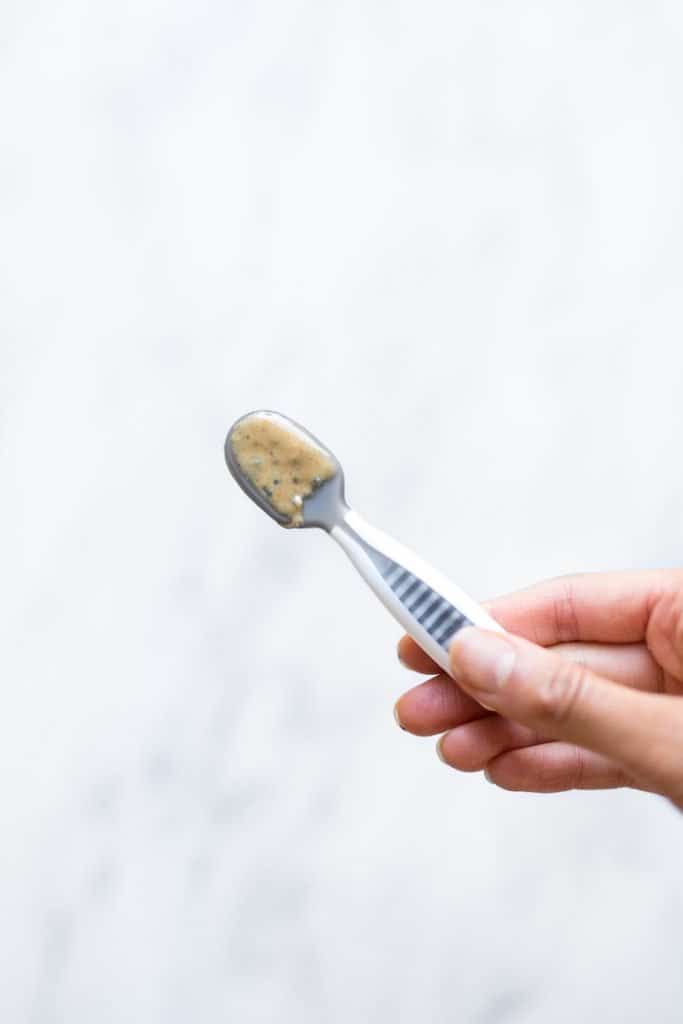Gone are the days of waiting until three years old to introduce your baby to peanuts and other foods that are high on the allergy list. We now know that waiting may actually increase the risk of allergies not lower it (oops!). Such is the life of nutrition research; you always have to be prepared to learn that new research may change what you think you know!
This is why we love being Registered Dietitians. Staying on top of current evidence isn’t just a hobby, it’s our job.
Back to business. Why did we ever think it was a good idea to delay introducing peanuts in the first place?
Babies are born with spaces between the cells in their digestive tract. Throughout baby’s first year of life the cells spaces tighten up, so that the cells are tightly bound together, like they are in an adult. The reason our cells are packed tightly together is to prevent particles from floating freely into the bloodstream. In this way the particles are forced to be absorbed through the various mechanisms of the cell or stay in the digestive tract for excretion. This serves as a protective function so that harmful substances don’t end up in circulation.
This was the theory behind waiting to introduce peanuts. It was thought that the whole peanut protein was entering the bloodstream via these loose junctions, causing the immune system to freak out about this foreign matter and mount an attack against it.
As it turns out, this theory was flat out wrong.
So scientists began to look at regions in the world where the rates of peanut allergies are very low. One such place is in Israel, where one of the common first foods for babies is a peanut “puff” (think peanut flavoured Cheeto). Yet Jewish children of similar ancestry (ie: genetically similar) living in America were not immune to the risk of peanut allergies so a genetic cause was ruled out.
Researchers took a group of babies at higher risk of developing a peanut allergy and divided them into two groups: one was instructed to feed peanuts 3x/week and the other was asked to keep the children peanut free. They tested all children at five years old and there were statistically fewer peanut allergies in the group that was fed peanuts!
In fact, the study showed that introducing peanuts before one year reduced the risk of allergy by 81%!
And this was in a group of kids who were allergy prone.
Researchers now believe that the rates of allergies went up when parents delayed the introduction of peanuts to three years because these babies were getting low dose exposure through the skin, which is not designed as a way to establish tolerance. Humans are designed to establish tolerance to a food by exposure through the digestive tract.
In light of this well-conducted study (and a couple of others), the peanut introduction guidelines have changed!
The New Peanut Guidelines
The guidelines are divided into three groups:
Babies at high risk: those with severe eczema or a known egg allergy should have a consult with an allergist to determine the best plan for their situation.
Babies at medium risk: those with mild eczema (controlled with skin applications) SHOULD start eating peanut products at 6 months and continue 3x/week.
Babies at low risk: can be introduced as the family is ready but there’s no need to specifically delay the introduction.
An additional key takeaway from the research is the importance of repeat exposure. This means, making efforts to safely offer your child peanut products a few times per week.
Essentially, it’s now recommended to give your baby peanuts once they start eating solid foods. But you can’t exactly just give a baby a whole peanut or even peanut butter since those would pose a choking hazard!
Our e-course, Start Solids Confidently, outlines exactly how to safely introduce your baby to peanuts as well as the other top food allergens.

Peanuts are Just 1 of 10 Top Allergens
Peanuts, eggs, and milk are the most common allergens in babies but there are 7 other foods that collectively make up more than 90% of all food allergies! We cleverly call these “The Top 10.” In our Rescue Resource package, we have a resource where we show you how to introduce all of these foods safely to baby. And our recipe book Whole Food Recipes for Your Baby has at least one recipe for each of the top 10 allergens!






